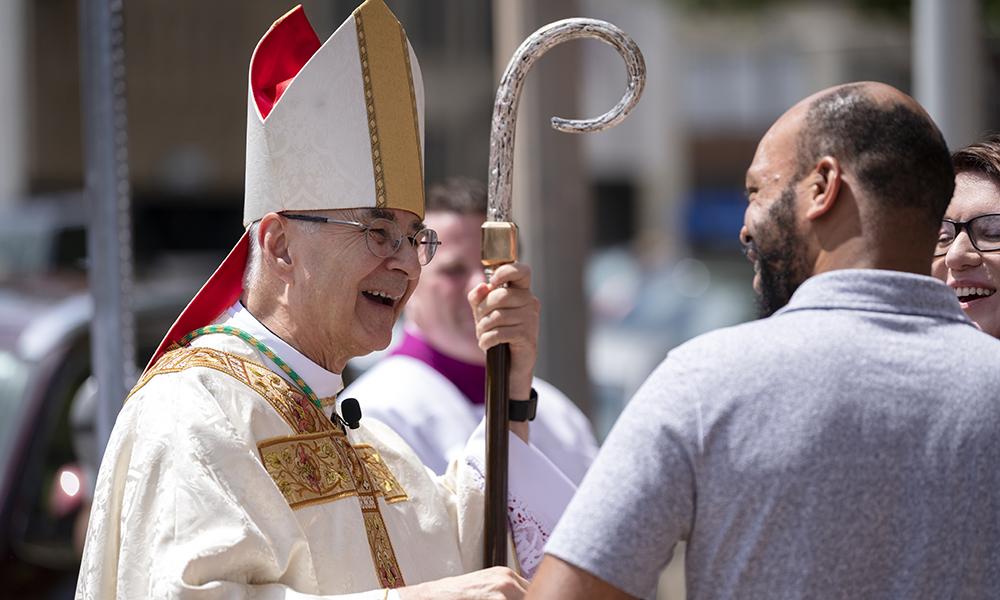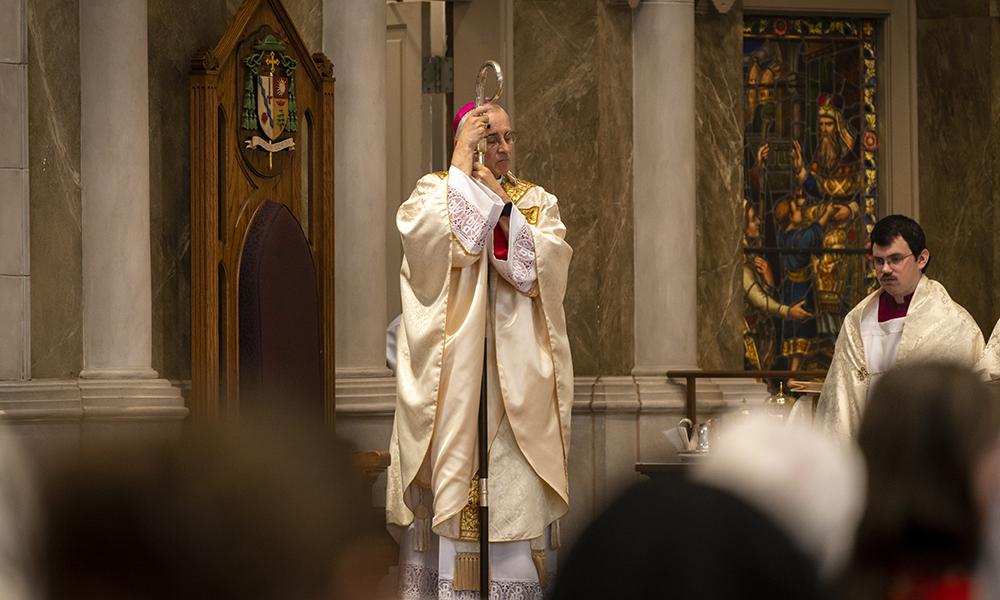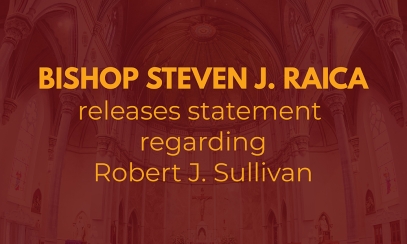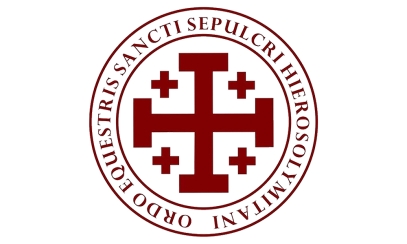
‘Guess who’s coming for dinner?’
Bishop Marks Episcopal Ordination Anniversary With Mass at the Cathedral
Bishop Marks Episcopal Ordination Anniversary With Mass at the Cathedral
On Aug. 28, Bishop Raica celebrated Mass at the Cathedral of St. Paul, marking the 8th anniversary of his episcopal ordination. He was consecrated by Archbishop Allen Vigneron at St. Mary, Our Lady of Mount Carmel Cathedral in Gaylord, Michigan in 2014. The complete text of his homily follows herein.
On Aug. 28, Bishop Raica celebrated Mass at the Cathedral of St. Paul, marking the 8th anniversary of his episcopal ordination. He was consecrated by Archbishop Allen Vigneron at St. Mary, Our Lady of Mount Carmel Cathedral in Gaylord, Michigan in 2014. The complete text of his homily follows herein.
My sisters and brothers, the Gospel has some curious twists and turns. Perhaps, like most events involving food in the Gospel, a meal with the Lord is oftentimes filled with surprise guests. We might say, “Guess who’s coming to dinner?” or “Guess what just happened?” Every event connected with food we read about, and in which we find our Lord in attendance, had some startling features. For instance, a wedding banquet that runs out of wine! “They have no wine,” His mother informs Him. And He takes water and miraculously produces wine “of a better vintage” and in great quantity! An unexpected abundance!
Or consider His gatherings on grassy knolls to hear Him speak that resulted in a picnic for 4,000 – 6,000 people! Nothing was planned. You remember they found a lad who had a “couple of loaves and a few fish.” Yet, that picnic produced leftovers filling “12 hampers” in a miraculous and unexplainable way. (cf. Jn 6:1-15) Again, an unexpected abundance!
Or consider Zacchaeus, a notorious tax collector, perched on a branch of a sycamore tree, trying to get a glimpse of this man everyone is talking about. Jesus shouts up to him, “I’m going to stay at your house.” Here Jesus is the unexpected / uninvited guest!
Or Martha and Mary, dear friends of our Lord, invited Him for dinner, and He admonishes Martha: “You are busy about many things; only one thing is necessary … Mary has chosen the better part.” Here Jesus is at home among friends.
The Last Supper was such an event – a familiar Passover meal with a new twist. The institution of the Eucharist and priesthood becomes part of the revision that He introduces to His closest associates, telling them, “Do this in memory of Me.” Here Jesus is identified with the bread and wine that will become His Body and Blood in abundance for the world!
Now consider the event in the Gospel at which we find ourselves today. Rumors circulated that here was a man who socializes with sinners “and eats with them.” Such is the life of the Lord – not staying always with the converted, not just preaching to the choir, but going out to the periphery, finding ways to reach out to those “most in need of mercy” and seeking those who were wounded and lost, inviting them to experience something that would totally amaze and astonish them. Perhaps, this may be the underlying purpose of the Eucharistic Revival that we have underway over the next few years! Our routine presence at Mass should awaken us to Eucharistic amazement – Christ doesn’t limit Himself but gives Himself totally to us!
We ride with assurance on the coattails of such an extraordinary gesture that brings us all to the banquet table of the Lord. What do we find here? Consider the following in terms of hospitality and etiquette.
The Gospel seems to add a few more “dos” and “don’ts” to the list of manners – much like we learned when we were children at home like: “Don’t slurp your milk or spaghetti … Use your fork and not your fingers.” This time He adds another piece of etiquette: Don’t sit in the place of honor at a dinner lest you get bumped lower by someone more important than you. (cf. Lk 14:8 ff) Do sit at the lowest place because then the only way to go is up. Don’t invite just your relatives and friends to your table. Do invite the poor, the disabled, the disadvantaged, those with misfortune or who live in solitude, those in need of mercy, or those who require an embrace of acceptance and understanding.
The lesson today is a reminder of our real place, presence, and position in the Kingdom. Jesus’ example today begins with the notion that God is really our host. We are His guests! He invites us to a banquet that we can’t quite grasp. We have no control over the invitation list. This may not be our idea of Heaven, but for people of Jesus’ day, who did not have readymade fast foods and buffets, the idea of Heaven as a huge, sumptuous, banquet must have been a real attention grabber – somewhat appealing and attractive to the listeners. Think of it: Maybe that’s how potluck suppers and smorgasbords got started – with a guy who had a couple of fish and some dried bread.
Another notable feature is something that I referred to a moment ago. Who will show up at this event? Our Lord had a way of bringing home some unusual dinner guests and introducing them to His Father and to us – a “look who I found” moment. In addition to the fairly common folk, He also brings sinners, thieves, the poor, the lame, the weak, and the marginalized of society.
In fact, the meal tickets are free. And Jesus’ guests, regardless of life status, all have one thing in common: they are hungry! (The hungrier you are, the better the meal). While a meal is the normal response to hunger, there is another response that may be even more important: it fosters and enhances a relationship. It connects people to each other! It touches our heart for what we are truly hungering for – not merely to satisfy our physical pangs for an instant, or a couple hours, or even a day, but a complete and total satisfaction that only an infinite presence can provide.
Our life as Christians is like that. At the very heart of our relationship with Christ is the acknowledgement that we are all beggars. We cannot tell our Lord how to run His business, though many often try or claim to have insider knowledge. It can be understood from the perspective that the beggar is the main actor on the stage of life. Those who are fascinated by literature would say, “The beggar is the protagonist of history.” We who continue to beg for the things we lack. God who begs for our hearts and our lives.
As people of faith, we admit this can only be done through faith, not in some “thing” but a Someone.; Someone Who loves us unconditionally, each of us, personally, with our own faults, failings, and flaws (i.e., our own hungers and thirsts); a Someone Who gives us a reason for living and the prospect of a destiny and future – and a freedom because we belong to Him. This person we come to know as Christ – the “Way, the Truth, and the Life.” He is a person, unlike others, Who spoke in such an exceptional way and with extraordinary gestures that we stop and take notice. “No one has ever spoken like this before.” That’s why Zacchaeus “hurried down.” (cf. Lk 19:1-10) That’s why the Samaritan woman “went and told her neighbors” about the extraordinary encounter she had at the well. (cf. Jn 4:1-42) That’s why the two disciples on the road to Emmaus, after the encounter with Christ, had to run all the way back to Jerusalem to tell the others: “We have seen the Lord!” (cf. Lk 24:13-35) Here is Someone Who answers what our hearts have been waiting for.
We re-learn this simple and essential lesson of Jesus today. We are His guests at this celebration we call the “Eucharist” where we are fed, nourished, and fortified with the Body and Blood of our Savior.
Our response to this mystery of faith is simple: “Thank You, Lord! … Thank You for this meal … Thank You for inviting me … Thank You for answering my need … Thank You for forgiving me … Thank You for Your mercy … Thank You for filling me with Your mercy and love.” For this, we seek and maintain an attitude of humility, as Sirach suggests, to recognize the true “giver of gifts.”
You see: “Guess who’s coming for dinner?” Here we are! “Blessed are those called to the supper of the Lamb.”




